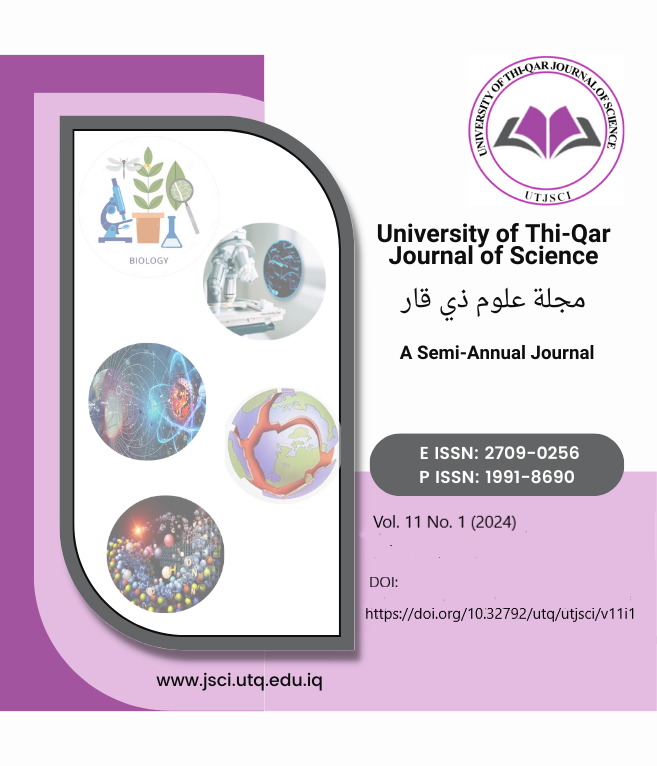Test the effectiveness of some medications and vitamin D3 used against COVID-19 on Gram-positive and Gram-negative bacteria isolated from people infected with the Coronavirus
DOI:
https://doi.org/10.32792/utq/utjsci/v11i1.1169Keywords:
COVID-19, Antibiotics, Antimicrobial activity, AntibioticsAbstract
The COVID-19 pandemic has led to a search for effective pharmaceuticals and vitamins to combat the virus. These therapies have antiviral capabilities and can affect both gram-negative and gram-positive bacteria. This study aims to assess the effectiveness of various medications and nutrients in treating bacterial infections linked to COVID-19. In vitro, tests will be conducted to evaluate these therapies' antibacterial efficacy against both gram-negative and gram-positive bacteria.
In the current study, we test a group of antibiotics commonly used in treating Coronavirus on different types of Gram-positive and Gram-negative bacteria. They found that Azithromycin was highly effective against both positive and negative bacteria, but its effectiveness decreased when combined with vitamin D. Levofloxacin was the most effective antibiotic, and its efficacy was not affected by the addition of zinc or vitamin D. Acyclovir had a slight effect on bacteria when used alone, but its efficacy improved with zinc. Zinc and Vitamin D had a high degree of effectiveness, but Vitamin D had relatively low efficacy, except against one type of bacteria.
The study aims to evaluate the effectiveness of drugs and vitamins against bacterial infections in COVID-19 patients. The results will provide a better understanding of the potential advantages of these medications in controlling bacterial infections. (The abstract should have one paragraph)
The study aims to evaluate the effectiveness of drugs and vitamins against bacterial infections in COVID-19 patients. The results will provide a better understanding of the potential advantages of these medications in controlling bacterial infections.
Received: 2024-02-12
Revised: 2024-03-04
Accepted: 2024-03-11
References
A. Zumla, J. F. Chan, E. I. Azhar, D. S. Hui, and K.-Y. Yuen, "Coronaviruses—drug discovery and therapeutic options," Nature reviews Drug discovery, vol. 15, pp. 327-347, 2016.
M. Denis, V. Vandeweerd, R. Verbeeke, A. Laudisoit, T. Reid, E. Hobbs, et al., "Covipendium: Information available to support the development of medical countermeasures and interventions against COVID-19," Transdisciplinary Insights, vol. 4, pp. 1-296, 2020.
P. C. Woo, S. K. Lau, Y. Huang, and K.-Y. Yuen, "Coronavirus diversity, phylogeny and interspecies jumping," Experimental Biology and medicine, vol. 234, pp. 1117-1127, 2009.
J. F.-W. Chan, K.-H. Kok, Z. Zhu, H. Chu, K. K.-W. To, S. Yuan, et al., "Genomic characterization of the 2019 novel human-pathogenic coronavirus isolated from a patient with atypical pneumonia after visiting Wuhan," Emerging microbes & infections, vol. 9, pp. 221-236, 2020.
C. Wang, P. W. Horby, F. G. Hayden, and G. F. Gao, "A novel coronavirus outbreak of global health concern," The lancet, vol. 395, pp. 470-473, 2020.
D. A. Alhasan and H. A. H. Al-Saidy, "Mini-Review: SARS-CoV-2 and COVID-19," University of Thi-Qar Journal of Science, vol. 8, pp. 7-13, 2021.
R. S. Grinbaum and C. R. V. Kiffer, "Bacterial infections in COVID-19 patients: a review," Revista da Associação Médica Brasileira, vol. 67, pp. 1863-1868, 2021.
R. C. Group, "Dexamethasone in hospitalized patients with Covid-19," New England Journal of Medicine, vol. 384, pp. 693-704, 2021.
V. Moreno-Torres, C. de Mendoza, S. de la Fuente, E. Sánchez, M. Martínez-Urbistondo, J. Herráiz, et al., "Bacterial infections in patients hospitalized with COVID-19," Internal and Emergency Medicine, vol. 17, pp. 431-438, 2022.
T. M. Rawson, L. S. Moore, N. Zhu, N. Ranganathan, K. Skolimowska, M. Gilchrist, et al., "Bacterial and fungal coinfection in individuals with coronavirus: a rapid review to support COVID-19 antimicrobial prescribing," Clinical infectious diseases, vol. 71, pp. 2459-2468, 2020.
C. Garcia-Vidal, G. Sanjuan, E. Moreno-García, P. Puerta-Alcalde, N. Garcia-Pouton, M. Chumbita, et al., "Incidence of co-infections and superinfections in hospitalized patients with COVID-19: a retrospective cohort study," Clinical Microbiology and Infection, vol. 27, pp. 83-88, 2021.
P. Gautret, J.-C. Lagier, P. Parola, L. Meddeb, M. Mailhe, B. Doudier, et al., "Hydroxychloroquine and azithromycin as a treatment of COVID-19: results of an open-label non-randomized clinical trial," International journal of antimicrobial agents, vol. 56, p. 105949, 2020.
C.-C. Lai, C.-Y. Wang, and P.-R. Hsueh, "Co-infections among patients with COVID-19: The need for combination therapy with non-anti-SARS-CoV-2 agents?," Journal of Microbiology, Immunology and Infection, vol. 53, pp. 505-512, 2020.
A. F. Gombart, A. Pierre, and S. Maggini, "A review of micronutrients and the immune system–working in harmony to reduce the risk of infection," Nutrients, vol. 12, p. 236, 2020.
W. B. Grant, H. Lahore, S. L. McDonnell, C. A. Baggerly, C. B. French, J. L. Aliano, et al., "Evidence that vitamin D supplementation could reduce risk of influenza and COVID-19 infections and deaths," Nutrients, vol. 12, p. 988, 2020.
M. Rondanelli, A. Miccono, S. Lamburghini, I. Avanzato, A. Riva, P. Allegrini, et al., "Self-care for common colds: the pivotal role of vitamin D, vitamin C, zinc, and echinacea in three main immune interactive clusters (physical barriers, innate and adaptive immunity) involved during an episode of common colds—practical advice on dosages and on the time to take these nutrients/botanicals in order to prevent or treat common colds," Evidence-Based Complementary and Alternative Medicine, vol. 2018, 2018.
P. Lepere, B. Escarguel, S. Yolartiran, and C. Escarguel, "COVID-19: can early home treatment with Azithromycin alone or with Zinc help prevent hospitalisation, death, and long-COVID-19? A review," medRxiv, p. 2020.12. 29.20248975, 2021.
V. Baker, "Acyclovir for SARS-COV-2: an old drug with a new therapeutic purpose-an observational study," Int J Clin Case Rep Rev, vol. 10, pp. 1-7, 2022.
E. R. German, M. K. Jairath, and J. Caston, "Treatment of Long-Haul COVID Patients With Off-Label Acyclovir," Cureus, vol. 15, 2023.
A. Yacouba, A. Olowo-Okere, and I. Yunusa, "Repurposing of antibiotics for clinical management of COVID-19: a narrative review," Annals of Clinical Microbiology and Antimicrobials, vol. 20, pp. 1-8, 2021.
I. Karampela and M. Dalamaga, "Could respiratory fluoroquinolones, levofloxacin and moxifloxacin, prove to be beneficial as an adjunct treatment in COVID-19?," Archives of medical research, vol. 51, pp. 741-742, 2020.
A. Bauer, W. Kirby, J. C. Sherris, and M. Turck, "Antibiotic susceptibility testing by a standardized single disk method," American journal of clinical pathology, vol. 45, pp. 493-496, 1966.
Clinical and L. S. Institute, "Performance standards for antimicrobial susceptibility testing," ed: Clinical and Laboratory Standards Institute Wayne, PA, 2017, pp. 106-112.
J. N. Kyvsgaard, U. Ralfkiaer, N. Følsgaard, T. M. Jensen, L. M. Hesselberg, A.-M. M. Schoos, et al., "Azithromycin and high-dose vitamin D for treatment and prevention of asthma-like episodes in hospitalised preschool children: study protocol for a combined double-blind randomised controlled trial," BMJ open, vol. 12, p. e054762, 2022.
P. Lepere, B. Escarguel, S. Yolartiran, and C. Escarguel, "Can Early Home administration of Azithromycin with Zinc Help Prevent Severe COVID-19 Disease Progression and Long-COVID?," Journal of Experimental Pathology, vol. 2, pp. 75-89, 2021.
F. Sadeghsoltani, I. Mohammadzadeh, M.-M. Safari, P. Hassanpour, M. Izadpanah, D. Qujeq, et al., "Zinc and respiratory viral infections: important trace element in anti-viral response and immune regulation," Biological trace element research, pp. 1-16, 2021.
M. Gómara-Lomero, A. I. López-Calleja, A. Rezusta, J. A. Aínsa, and S. Ramón-García, "Repurposing azithromycin in combination with last-line fosfomycin, colistin and tigecycline against Multi-Drug Resistant Klebsiella pneumoniae," bioRxiv, p. 2022.07. 03.498633, 2022.
M. Skwarczynski, S. Bashiri, Y. Yuan, Z. M. Ziora, O. Nabil, K. Masuda, et al., "Antimicrobial activity enhancers: towards smart delivery of antimicrobial agents," Antibiotics, vol. 11, p. 412, 2022.
M. B. Jalil and M. Y. N. Al Atbee, "The prevalence of multiple drug resistance Escherichia coli and Klebsiella pneumoniae isolated from patients with urinary tract infections," Journal of Clinical Laboratory Analysis, vol. 36, p. e24619, 2022.
A. T. Blaszczyk, K. Sandlin, S. Mirza, L. Hernandez, H. Bader, and R. G. Hall, "Potential for drug interactions and polypharmacy from treatment of COVID-19 in long-term care," Journal of the American Medical Directors Association, vol. 23, pp. 949-950, 2022.
A. M. Mhaibes and F. K. Abdul-Wahab, "Nephroprotective effect of vitamin D Against Levofloxacin-induced renal injury: an observational study," Journal of Medicine and Life, vol. 16, p. 1032, 2023.
E. Buyukguzel and K. Buyukguzel, "Effect of acyclovir on the microbial contamination in the artifical and natural diets for rearing of Galleria mellonella L. larvae," Karaelmas Fen ve Mühendislik Dergisi, vol. 6, pp. 105-110, 2016.
V. J. Wallace, E. G. Sakowski, S. P. Preheim, and C. Prasse, "Bacteria exposed to antiviral drugs develop antibiotic cross-resistance and unique resistance profiles," Communications Biology, vol. 6, p. 837, 2023.
S. Ashenafi, J. Mazurek, A. Rehn, B. Lemma, G. Aderaye, A. Bekele, et al., "Vitamin D3 status and the association with human cathelicidin expression in patients with different clinical forms of active tuberculosis," Nutrients, vol. 10, p. 721, 2018.
C. L. Greiller and A. R. Martineau, "Modulation of the immune response to respiratory viruses by vitamin D," Nutrients, vol. 7, pp. 4240-4270, 2015.
A. Maiti and W. A. Jiranek, "Inhibition of Methicillin-resistant Staphylococcus aureus-induced cytokines mRNA production in human bone marrow derived mesenchymal stem cells by 1, 25-dihydroxyvitamin D 3," BMC Cell Biology, vol. 15, pp. 1-13, 2014.
E. M. Haisma, M. H. Rietveld, A. de Breij, J. T. van Dissel, A. El Ghalbzouri, and P. H. Nibbering, "Inflammatory and antimicrobial responses to methicillin-resistant Staphylococcus aureus in an in vitro wound infection model," PloS one, vol. 8, p. e82800, 2013.
M. K. Sarangi, "An overview of tuberculosis chemotherapy–a literature review," Journal of Applied Pharmaceutical Research, vol. 4, pp. 20-32, 2016.
B. A. Haider, Z. S. Lassi, A. Ahmed, and Z. A. Bhutta, "Zinc supplementation as an adjunct to antibiotics in the treatment of pneumonia in children 2 to 59 months of age," Cochrane Database of Systematic Reviews, 2011.
Z. Emami-Karvani and P. Chehrazi, "Antibacterial activity of ZnO nanoparticle on gram-positive and gram-negative bacteria," Afr J Microbiol Res, vol. 5, pp. 1368-1373, 2011.
Downloads
Published
License
Copyright (c) 2024 University of Thi-Qar Journal of Science

This work is licensed under a Creative Commons Attribution 4.0 International License.













